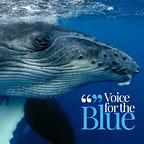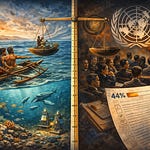I wasn’t planning to record or write today, but I have to speak directly to the people in the room where the future of the Global Plastics Treaty is being decided.
Today is the final day of negotiations in Geneva. Right now, this very minute, every word spoken could decide whether humanity finally turns the tide on plastic pollution… or hands another decade to corporate delay.
What’s at Stake
This treaty could set binding limits on virgin plastic production, holding petrochemical giants to account and slowing the flood at its source.
Or it could be gutted by nations with deep ties to oil and gas, redirected toward waste management “solutions” they know will fail: disposal, incineration, and recycling schemes that push responsibility back onto the public.
Recycling was never meant to carry the weight of this crisis. It’s like telling firefighters to use teacups on a forest fire, while the arsonists keep pouring petrol on the flames.
The Reality
Wildlife: Plastic has been found in all seven species of sea turtles, around 56% of whale, dolphin, and porpoise species, and 386 out of 555 fish species, including 210 we eat commercially.
Humans: Microplastics are in our blood, lungs, and placentas. Ultrafine particles small enough to lodge deep in the lungs make up most airborne plastic. A French study estimates adults inhale 68,000 of them daily.
Geneva Itself: Greenpeace testing found plastic fibres in cafes, on public transport, and even in the meeting rooms where this treaty is being decided.
The Pressure in the Room
At least 234 fossil fuel and petrochemical lobbyists are there, many embedded within national delegations. As demand for oil in transport and energy falls, these industries are doubling down on plastics for short-term profit, no matter the long-term cost.
The Choice
If you are in that room today, history is listening. Fail here, and you condemn future generations to live, and die, with the consequences. Succeed, and this could be remembered as the moment the world finally turned the tide.
By 2050, there could be more plastic in the ocean than fish by weight. That future is not inevitable. The clock is almost at zero.
If you’re hearing this, please share it. I’m hoping some of the people in that room in Geneva might see it, but even if they don’t, they need to know the world is watching. Just because this isn’t splashed across headlines doesn’t mean we aren’t paying attention. Every share sends a signal: we care, and we will remember what happens here.












